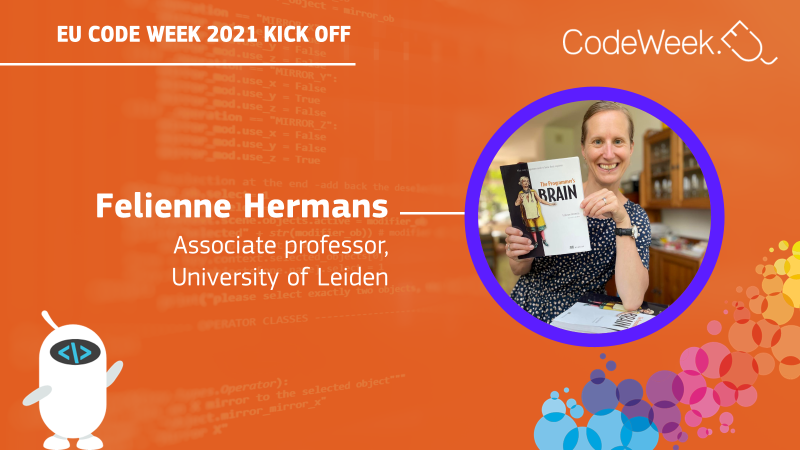Felienne Hermans: “Nowadays things are a lot easier for people that want to get started!”
13/10/21
Felienne is an associate professor at the Leiden Institute of Advanced Computer Science at Leiden University where she leads the research on programming education.
The EU Code Week community had the pleasure of getting to know Felienne at the EU Code Week Launch Event, where we learned that her great passion is to teach as many people as possible how to programme and to share her enthusiasm on this topic with others.
For Felienne, programming was not really a choice, but a necessity. “When I was young you needed to programme to get the computer to do anything. So, you sort of had to learn to programme.” She remembers that back then, with no YouTube or internet, she “learned it all from books and together with friends.”
Felienne’s memory of learning with her peers resonated deeply within the Code Week community, where thousands of pupils join Code Week. “Luckily nowadays things are a lot easier for people that want to get started!” Felienne says, adding that many resources are now available for people of all ages, looking to enter the coding and programing world.
Felienne emphasises that there is a lot of value in opening up this opportunity to kids at an early age. Based on her experience “when kids get older they get discouraged, especially girls. They think programming is not fun, or not for them, or that they cannot learn it.”
“The younger kids are when they learn that programming and tech are fun, valuable and learnable, the better.” As she herself teaches youngsters at a local high school, her views on why to include this experience in the curriculum go beyond motivation and engagement. “Programming is important and valuable. Like other courses, some kids will like it and others will be less excited. But we need to make sure everyone at least gets a basic understanding.”
As part of her work, she created Hedy, a progressive tool for teaching kids to code. According to Felienne, Hedy is gradual, which means that there is no need to learn all the rules at once. “The first few levels do not have that many rules, so you can get used to programming comfortably. At every level we add new rules, increasing the number of commands – the instructions for the computer – that you know.”
“Our strategy with Hedy is to show that with coding, you can make all sorts of things! Artworks with a drawing turtle, songs the computer can sing to you, or day-to-day tasks like the division of chores in the house. Everyone can use programming!”


